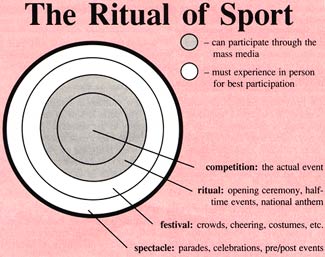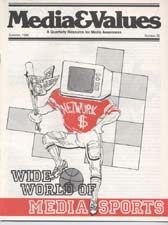PASTORING: Holy Arenas! A Look at Sport As Ritual
|
This article originally appeared in Issue# 36
|
Since ancient times, the holding of sports events has been linked to religious experience.
In Greece, the Olympics were only one set of athletic contests performed in honor of the gods and goddesses. Among the Mayans in Central America, the stadium, which was adjacent to a temple, was adorned with religious images and reliefs of sacred animals. The ball game started when the high priest threw the ball onto a sacred rock in the middle of the field. The Mayans believed the rock was the center of creation.
Today our sports events are not so explicitly religious. Or are they?
Michael Novak notes: "To have a religion, you need to have a way to exhilarate the human body, and desire, and will, and the sense of beauty, and a sense of oneness with the universe and other humans. You need chants and songs, the rhythm of bodies in unison, the indescribable feeling of many who together 'will one thing' as if they were each members of a single body. All these things you have in sports.., sports are a form of religion."
For many, televised sports events, particularly spectacles like the Super Bowl and the Olympics, function as major religious festivals, the "high holy days" of our media culture.
But as we've learned from the electronic evangelists, only a small part of the televising of religious experience can be transmitted through the picture tube. For those of us with traditional pastoral responsibilities, understanding the limitations of these electronic rites provides us an opening to heal the human hungers we encounter after the game is over.
Anthropologists analyze the sports event as a series of concentric circles.

At the center is the actual athletic competition — the race, the game, the match.
Around that is the ritual: opening, closing ceremonies, tossing a coin or firing the starting gun, awarding trophies, singing of one's national anthem.
At these inner levels, television technology excels. Indeed, television brings us up close and in person, providing a view and an emotional connection that is simply not available to the spectator in the stands.
Beyond these two circles the small screen loses its power. To participate fully in the festival aspects, for example, one simply has to be there in person cheering, singing, waving flags, experiencing the crush of the crowd. It's the sense of community, of "belonging" that every human heart craves.
Furthermore, all sports events operate at a level of spectacle. Accompanying parades, advance preparations, victory celebrations, the touting of civic or ethnic pride invite the members of the society (whether school, city or nation) to integrate the meaning of the event into their symbol system or mythology. This "cosmic ordering" is significant to bring spectators and participants alike back to daily life with a sense of completion and fulfillment.
The substitution of sports for authentic religious ritual presents a challenge for pastors and ministers of all faiths — and not just in the attendance figures for Sunday morning.
Far beyond the counting of noses is the counseling of hearts. Given our media-saturated culture, we might ask ourselves (and our pastoral staff) the following:
- Is the worship experience in our congregation truly a community-bonding ritual? Or does it, like TV sports (or TV religion), play to the audience as distant viewers, alone and isolated from one another?
- Can I use today's sports mania to preach about the meaning of ritual in human life? To help people find (or develop) the authentic rites that satisfy our spiritual need for 'cosmic ordering?"
- Do we repeat tired rituals year after year or are we developing community celebrations that incorporate the experience of contemporary life — getting a driver's license? …moving into retirement? …physical fitness and healthy nutrition?
- What about the sports programs we sponsor for our children and youth? Are they wholesome athletic endeavors or do they merely imitate commercialized competitions?
- How do we sanctify and celebrate our physical bodies as created in goodness?
The sacred rock may be gone, but there are still lessons to be learned "at the old ball game."



